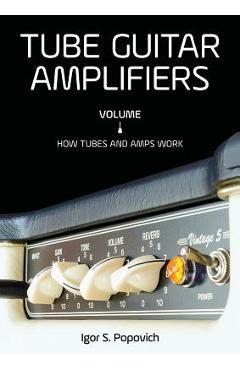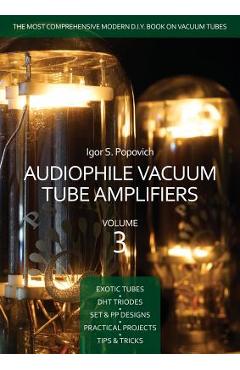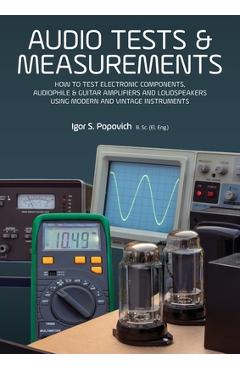Tube Guitar Amplifiers Volume 1: How Tubes & Amps Work - Igor S. Popovich

Detalii Tube Guitar Amplifiers Volume 1:
libris.ro
458.54 Lei
509.49 Lei
Technology & Engineering
Igor S. Popovich
Tube Guitar Amplifiers Volume 1: - Disponibil la libris.ro
Pe YEO găsești Tube Guitar Amplifiers Volume 1: de la Igor S. Popovich, în categoria Technology & Engineering.
Indiferent de nevoile tale, Tube Guitar Amplifiers Volume 1: How Tubes & Amps Work - Igor S. Popovich din categoria Technology & Engineering îți poate aduce un echilibru perfect între calitate și preț, cu avantaje practice și moderne.
Preț: 458.54 Lei
Caracteristicile produsului Tube Guitar Amplifiers Volume 1:
- Brand: Igor S. Popovich
- Categoria: Technology & Engineering
- Magazin: libris.ro
- Ultima actualizare: 28-10-2025 01:22:05
Comandă Tube Guitar Amplifiers Volume 1: Online, Simplu și Rapid
Prin intermediul platformei YEO, poți comanda Tube Guitar Amplifiers Volume 1: de la libris.ro rapid și în siguranță. Bucură-te de o experiență de cumpărături online optimizată și descoperă cele mai bune oferte actualizate constant.
Descriere magazin:
Volume 1 of the most complete and practical modern reference on tube guitar amplifiersThe first three chapters of this unique book cover introductory topics such as basic electronic circuits and passive components (resistors, capacitors, inductors), the building blocks of tube amplifiers. Audio amplifiers are also investigated as black boxes, from the outside perspective, and important concepts such as spectra, gain, bandwidth and distortion are introduced.Chapters four to six explain operational principles behind vacuum tubes (diodes, triodes, tetrodes and pentodes), and their use as rectifiers and active amplification components in guitar amps.The rest of the book progresses through various stages of guitar amps, from input circuits and preamplifier stages, through tone control circuits and analog effects, to output or power stages.After the in-depth coverage of tube power supplies, single-ended output stages (triode, pentode and ultralinear) are covered first, followed by phase inverters and push-pull circuits.Various types of negative feedback are explained, together with their benefits and drawbacks. The associated controls such as Presence, Resonance and Texture(TM) are also discussed, using Peavey ValveKing 212 amp as a case study.Despite claims by their manufacturers, many modern guitar amps aren\'t all tube at all, but hybrid designs. Most have a single tube in preamp stages to color the sound, and a cheap solid state output stage (usually using integrated circuits). Others take the opposite approach, choosing semiconductor preamp stages and a tubed power stage. For that reason solid state (semiconductor) components and amplifiers are covered here briefly, together with two examples of hybrid amps.This practical DIY manual is richly and professionally illustrated with photographs of tubes, components and amplifiers, circuit diagrams, tube pinouts, curves and loadlines, graphs and charts. These valuable illustrations make it faster and easier to comprehend issues, a picture is truly worth a thousand words! All the information required to design and build tube guitar amplifiers is compiled in one place.Who is this book for? -Guitar players wanting to learn how tubes and tube amplifiers work.- DIY constructors who want to build, service or modify tube guitar amps.- Buyers and sellers of tube guitar amps who need a better understanding of tube technology.- Electronic technicians and engineers familiar with solid state devices and amps

Produse asemănătoare
Produse marca Igor S. Popovich

Audiophile Vacuum Tube Amplifiers - Design, Construction, Testing, Repairing & Upgrading, Volume 1 - Igor S. Popovich
![]() libris.ro
libris.ro
Actualizat in 28/10/2025
520.42 Lei

Audiophile Vacuum Tube Amplifiers Volume 3 - Igor S. Popovich
![]() libris.ro
libris.ro
Actualizat in 28/10/2025
520.42 Lei

Audiophile Vacuum Tube Amplifiers - Design, Construction, Testing, Repairing & Upgrading, Volume 2 - Igor S. Popovich
![]() libris.ro
libris.ro
Actualizat in 28/10/2025
520.42 Lei

Tube Guitar Amplifiers Volume 1: How Tubes & Amps Work - Igor S. Popovich
![]() libris.ro
libris.ro
Actualizat in 28/10/2025
458.54 Lei

How to Use, Calibrate, Repair and Upgrade Vacuum Tube Testers - Igor S. Popovich
![]() libris.ro
libris.ro
Actualizat in 28/10/2025
483.23 Lei
